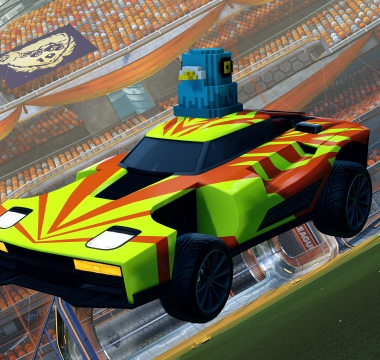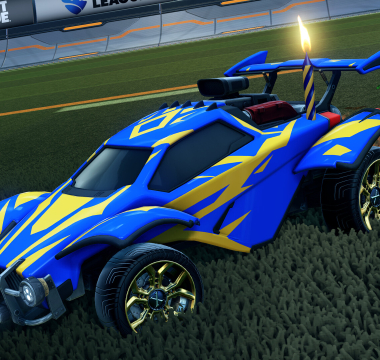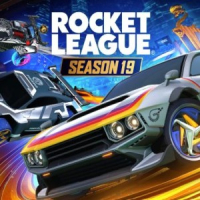Rocket League Review
Few games have managed to combine the thrill of competitive sports with the tactile satisfaction of physics-driven vehicles like Rocket League®. What initially sounded like a quirky idea — cars playing soccer — has since evolved into one of the most enduring esports and casual multiplayer experiences of the last decade. Blending arcade action with mechanical depth, Rocket League remains a standout not just for its uniqueness, but for how skillfully it evolves to meet the expectations of both hardcore and casual players alike.
After going free-to-play, Rocket League has seen a resurgence in player count and accessibility. Whether you're here to chase ranked glory or just want to do backflips in an RC-like battle-car, there's something here for nearly every type of gamer. But what really makes Rocket League such a satisfying title to install and revisit in 2025? Let’s take it for a spin.
Gameplay That’s Simple to Learn
At its core, Rocket League's gameplay loop hasn’t changed: two teams of rocket-powered vehicles battle to score goals in a futuristic arena. Matches are short and explosive, typically running five minutes per game, but they pack a lot of intensity into each second. The controls are tight, and the physics are consistent — a rare combo that allows for precise play without randomness.
There’s no need for a traditional tutorial. You can jump into a casual match within minutes of download and have a decent understanding of how to boost, flip, and dribble the ball. But as you continue to play, the true depth emerges. Mastering aerials, flip resets, wave dashes, and rotation strategies adds layers of complexity that make Rocket League one of the most technically demanding multiplayer games on any modern platforms.
Customization and Identity
Rocket League excels at giving players ownership over their style. Cosmetic options — including wheels, decals, rocket trails, and goal explosions — can be unlocked through gameplay, purchased via the item shop, or earned in seasonal challenges. While purely visual, these elements allow players to express themselves in a way that feels organic. The game’s car garage is extensive and constantly expanding through events and collaborations.
Despite its free-to-play model, Rocket League avoids becoming pay-to-win. No advantage comes from purchases, and progression feels steady even without spending money. The result is a competitive environment where performance is always tied to skill.
Multiplayer and Matchmaking
Whether playing 1v1 duels or chaotic 4v4 matches, Rocket League’s matchmaking system is generally solid. Ranked and casual modes are separated cleanly, with enough active players across regions to ensure quick match times. Partying up with friends works seamlessly, and cross-platform play across PC, PlayStation, Xbox, and Nintendo Switch means you can take the field with just about anyone.
Even with its competitive nature, Rocket League doesn’t pressure players into high-stakes play. There are extra modes like Rumble (with power-ups), Hoops (basketball), and Dropshot (floor-breaking madness), offering different experiences for those looking to shake things up. These modes also serve as a break from the more demanding standard playlist, and they help keep the gameplay fresh.
Visuals and Sound Design
Rocket League has aged well visually. Its vibrant arenas, flashy goal effects, and crisp car models run at a smooth 60 FPS on most systems. The aesthetic is clean and futuristic without feeling overdesigned, and newer arenas feature dynamic weather and lighting effects that don’t interfere with gameplay clarity.
Sound design is punchy, with roaring engines and satisfying collision sounds. The music, curated by Monstercat, leans into energetic EDM and synth-driven beats, adding to the game’s modern, adrenaline-fueled feel. Each menu theme or goal celebration is part of what makes Rocket League’s identity feel alive and evolving.
Competitive Scene and Community Mods
Rocket League’s esports presence is massive. The Rocket League Championship Series (RLCS) continues to thrive, with seasonal tournaments offering top-tier play to watch and learn from. The competitive community is welcoming to new players, with countless tutorials, coaching sessions, and Discord servers designed to help people improve.
Mods have long played a role in the Rocket League scene. On PC, players can use modding platforms to install custom maps, training packs, and visual enhancements. While official support for mods is limited, tools like BakkesMod have become essential for competitive practice. These mods don’t provide cheats — rather, they help refine skill and offer extra replay features or UI improvements.
Accessibility and Playing Unblocked
Thanks to its relatively small file size and fast install process, Rocket League is accessible to a wide range of users. It's easy to run on most PCs, and cloud gaming platforms make it possible to play from almost anywhere, including school or work settings, though restrictions may apply. While not technically unblocked on all networks, creative users can launch the game via services like GeForce NOW or browser-based remote access tools.
Is Rocket League Still Worth Playing?
Absolutely. Rocket League is one of the few multiplayer games that feels truly timeless. The core gameplay hasn’t changed much since launch, and that’s a testament to how well it was designed from the start. Its competitive ceiling is sky-high, but casual players will still find plenty of ways to enjoy a few matches without stress.
With free access, broad platform availability, and a constantly rotating catalog of events and content drops, Rocket League has more staying power than ever. Whether you’re grinding ranked playlists, messing around in casual lobbies, or practicing flicks in training packs, there’s always a reason to get back behind the wheel.
How to download Rocket League
Rocket League is available as a free download on the Epic Games Store for PC users. Console players can access it via their respective digital storefronts: PlayStation Store, Xbox Marketplace, and Nintendo eShop. The game is completely free to play, with optional cosmetic purchases and seasonal content passes available.
Supported platforms include PC, PS5, PS4, Xbox Series X|S, Xbox One, and Nintendo Switch. Mac and Android do not support native versions, but users have managed to play using cloud platforms or emulators, although performance may vary.
To install Rocket League, visit your preferred digital store, locate the game, and select the “Install” button. On PC, you'll need the Epic Games Launcher. The download size is under 10GB, making it quick to set up on most connections.
Minimum requirements for PC are: Windows 7 or newer, 4GB RAM, 2.5 GHz dual-core CPU, and a GPU supporting DirectX 11. Console users should ensure they have updated firmware and around 10GB of storage space.
Rocket League does not support in-game cheats. However, PC mods like BakkesMod are widely used for training and UI customization. These mods are allowed in offline and private matches but not in ranked matchmaking.
The game is not automatically unblocked on school or work networks, but can be played using remote desktop software or cloud platforms like Boosteroid and GeForce NOW, depending on network permissions.
Pros

- Tight and responsive controls perfect for high-level play
- Endless skill ceiling keeps gameplay fresh
- Free-to-play with generous content offerings
- Cross-platform support on all major systems
- Thriving esports and content creator community
- Creative mods and training tools available on PC
Cons

- Steep learning curve for competitive modes
- Some features require third-party tools to unlock full potential
- Limited mod support on console platforms
Screenshots



-
Rating:
4.5
-
Voted:
429719
-
Autor:
Psyonix LLC
-
Size:
20 GB available space
